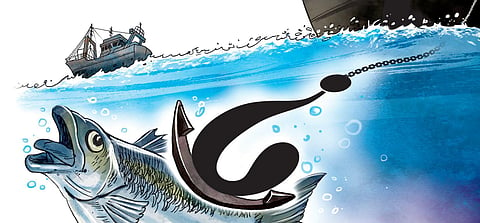

Three significant aspects of Union External Affairs Minister S Jaishankar’s recent visit to Sri Lanka need to be highlighted. First, the timely medical assistance to tackle the problems posed by Covid-19; second, New Delhi’s hope that Sri Lanka “in its interest” should fulfil the aspirations of the Tamil community for equality and dignity in a united Lanka; and third, finding a durable solution to the travails of fishermen in the Palk Bay. My focus is on the third subject, which has eluded a solution for the past several decades.
The fisheries issue, according to Jaishankar, was discussed in the earlier Joint Working Group in an “open and candid manner”. He also had a meeting with the Sri Lankan Minister for Fisheries Douglas Devananda. The outcome of the meeting is not known. The two countries are at present engaged in a “fire-fighting exercise”. The Indian fishermen who get detained in Sri Lankan waters are released after a few days; the detained trawlers are also given back. Trawlers and fishermen are back in Sri Lankan waters the next day.
What is required is not this sort of fire-fighting; it is essential to extinguish the causes of fire once and for all. It can be done only if New Delhi and Tamil Nadu recognise the fact that the fault lies with Tamil Nadu fishermen. Fishermen throughout the world are no respecters of maritime boundaries; they move wherever the fish moves. It is a universal phenomenon; Sri Lankan fishermen poach into Indian and Maldivian waters; Indian fishermen enter Pakistani and Bangladeshi waters, and Japanese and Taiwanese trawlers roam around the world.
The only way to find a solution is to change our mindset; we should adopt a new paradigm of thinking. I have been advocating that the two countries can, if they have the will and the determination, convert the contested territory into a common heritage. The roots of the problem can be traced to the mid-1960s when India was facing a foreign exchange crisis. To boost exports, Indira Gandhi introduced trawlers to catch prawns. Prawns were a delicacy in Japan and Europe, and exports went up. But the introduction of trawlers had unfortunate consequences.
First, fishermen became wage labourers; non-fishermen, including politicians, entered the fray and became trawler owners. Equally relevant, bottom trawling led to the destruction of marine life. The trawlers swept the sea bed clean. Since there was no fish on the Indian side, our fishermen began to enter Sri Lankan waters. The protracted ethnic conflict was a godsend. Fishing was banned in Sri Lanka and many Lankan fishermen came to Tamil Nadu as refugees. They worked for the trawler owners and directed the trawlers to areas where there was an abundance of fish.
When I visited Pesalai, a fishing village in Sri Lanka’s Mannar district, the fishermen told me: “Sir, stay here tonight. Early in the morning you can see Indian trawlers 500 metres away from the shore.” The fishermen in Neduntheevu told me that on the three days Indian fishermen fished in Sri Lankan waters, they did not go for fishing because their nets would be cut by the Indian trawlers. The trawlers also muddied the waters; as a result, when they fished the next day, they could not catch much fish. The fishermen argued, with justification, that if bottom trawling continued, there would be no marine life on the Sri Lankan side of the Palk Bay too.
What must be highlighted is the fact that bottom trawling is banned in Sri Lanka. The recalcitrant Indian fishermen received solid support from both the DMK and AIADMK governments. During the ethnic conflict, the Palk Bay was the conduit through which the LTTE war machine was fuelled. The DMK and the AIADMK were engaged in mutual mud-slinging, each accusing the other of not protecting fishermen’s interests. A chief minister even went to the extent of demanding the retrieval of Kachchatheevu by peaceful means, if possible, and by force if necessary.
What the politicians in Tamil Nadu do not realise is the fact that if the Sri Lankan government approaches the International Court of Justice against India, the image of our country, especially TN, would take a nosedive. The success of diplomacy consists of converting a crisis into an opportunity. New Delhi must embark on deep-sea fishing in a big way. Tamil Nadu fishermen must be encouraged to take to deep-sea fishing. According to specialists, trawlers could, with some modifications, be converted to small fishing boats catering to the mother ship in the mid-sea.
Simultaneously, the trawlers must be withdrawn from the Palk Bay. With trawlers out of the scene, a conducive atmosphere would be created. A Palk Bay Authority, consisting of specialists from both governments, representatives of fishermen’s associations and navies should be constituted to determine ideal sustainable catch, how to enrich the sea jointly, the type of fishing equipment that can be used and the number of fishing days for each country. Let Sri Lankan fishermen fish for three days and Indian fishermen fish for three. The Palk Bay is increasingly becoming a conduit for drug traffic and there could be joint naval cooperation for tackling this menace. Thus the Palk Bay could be transformed from a contested territory to a common heritage, which it was for several centuries.
(The author was the Founding Director of the Centre in the University of Madras)
V Suryanarayan (suryageeth@gmail.com)
Senior Professor (Retd), Centre for South and Southeast Asian Studies, University of Madras